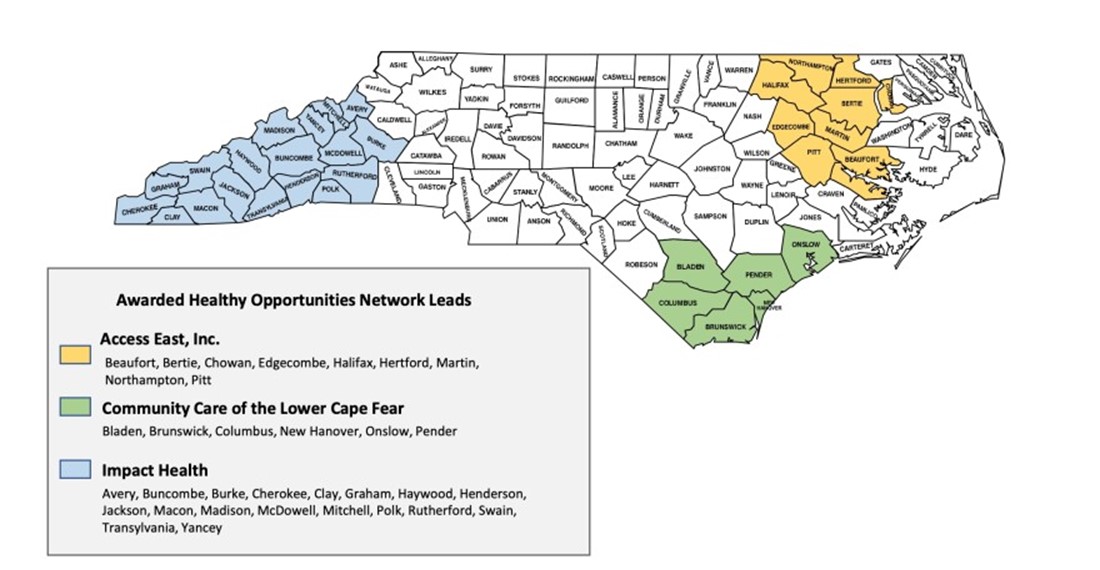MM Curator summary
[MM Curator Summary]: The NC Healthy Opportunities pilot will begin reimbursing plans for food delivered to Medicaid members this week, and a rental subsidy program for members begins soon.
The article below has been highlighted and summarized by our research team. It is provided here for member convenience as part of our Curator service.
Bounty and Soul
/
Bounty and Soul
Produce Market at Bounty & Soul
Starting Tuesday, up to 20,000 low-income North Carolinians will be able to get help with food, and it will be paid for by Medicaid.
It’s part of a $650 million experiment to test whether some Medicaid money would be better used to pay for patients’ underlying social needs.
There’s a lot of research that shows up to 80% of a person’s health is determined by things like access to healthy food, safe housing and adequate transportation. For example, senior citizens who get Meals on Wheels are less likely to end up in the hospital than those on the program’s waitlist.
North Carolina is now testing whether Medicaid managed care can get people healthier by paying for food, housing, transportation, even protection from violence. And it’s testing whether that will result in medical savings too. Jay Ludlam is leading the pilot program at the North Carolina Department of Health and Human Services.
“There has been a lot of conversations about it. A lot of conferences about it,” Ludlam said. “But North Carolina’s doing it in the field, and it ‘s absolutely exciting.”
The NC DHH S says it’s the first state to run a system-wide experiment to see how much social services will improve health. The pilot will take place in 33 of the state’s 100 counties. Mecklenburg is not include d. Counties closest to the Charlotte area that are part of the pilot include Rutherford, Burke and McDowell.

North Carolina Department of Health and Human Services
/
North Carolina Department of Health and Human Services
Healthy Opportunities Pilot Project
Doctors of poorly-nourished patients in those counties can help them get healthy food.
“If they recognize that somebody has a food insecurity, then by making the referral, our organization will deliver that food,” Ludlam said.
Here’s how it works: A doctor refers a patient by entering the name in a computer system. Then managed care plans have to confirm that patient is eligible according to state rules. For example, an adult who’s had five emergency room visits in a year, or has multiple chronic illnesses could get help if they also have trouble accessing healthy food.
“That could be, for example, a member that’s obese and that also suffers from diabetes and depression,” said Hannah Tyson, who heads the pilot at AmeriHealth Caritas, one of the state’s managed care plans.
After Tyson’s staff gives the okay, the referral goes to a network of participating food banks and community organizations like Bounty and Soul in Black Mountain. It distributes fresh produce for free to those who need it. Paula Sellars is the deputy director .
“When the referral comes in, we make a call to each and every person that’s referred,” Sellars said. “And we will describe what we’re going to provide for them.”
One of the things they could provide is a box of food containing grains, peanut butter and lots of fresh local produce.
Sellars says they’ve been preparing for a huge increase in customers.
“We’ve had to look at every last logistic. Like where do we even get these physical boxes from, and can we get them at a cost that works just as a small example,” Sellars said.
State rules set the prices. For example , a large box of food — enough to feed four people two meals a day for a week — is $136.06 if it’s picked up, $141.06 if it’s delivered.
Food banks will bill the managed care plans, which are then paid by Medicaid.
And the computer system will notify the doctor’s office to let it know the patient got the food, so it can follow up.
UNC – Chapel Hill researchers will evaluate the impact on patient health.
N .C . Department of Health’s Jay Ludlam says the pilot will change as results come in.
“We’ll take down the interventions that don’t work, we’ll feed the interventions that do work.”
Ludlam says managed care companies will do their own analyses.
“We believe as part of our design that they will flow like water to those interventions that are improving the health of North Carolinians and they will continue to provide those services because they will help the managed care organizations be more profitable.”
But that’s way down the road. First , the rest of the pilot has to roll out. Assistance with housing and transportation is scheduled to start on May 1 . Eligible patients may then get help paying a security deposit or first month’s rent, for example. Victims of violence will get services like home visits starting on June 15 .
It’s not clear how long the pilot project will last. That’s under negotiation with the federal government.
Clipped from: https://www.bpr.org/bpr-news/2022-03-15/some-medicaid-patients-will-start-getting-help-with-food-and-shelter
